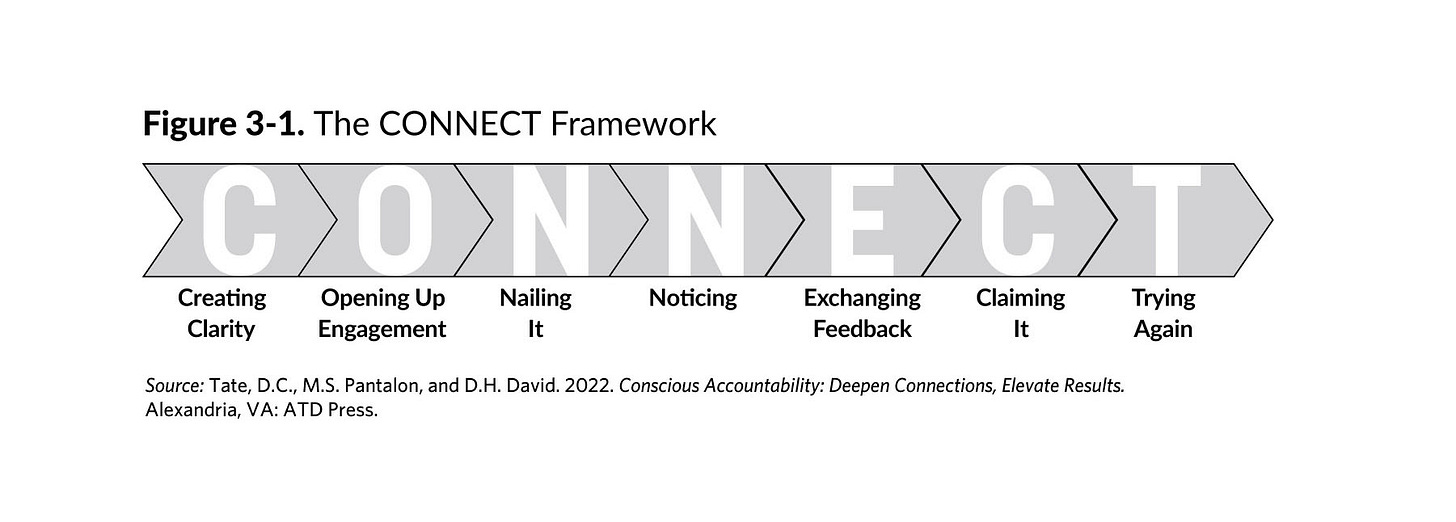Valuing relationships AND results
or, an interview with Daryn David about being consciously accountable at work and home
A Cup of Ambition is a weekly newsletter filled with thought-provoking essays, interviews, links, and reflections on all things related to working motherhood. If you are here because someone shared this with you, I hope you’ll subscribe by clicking on the button below.
This week, I am thrilled to introduce you to my friend and colleague, Daryn David. Daryn is a licensed clinical psychologist, educator, and leadership development coach. At the Yale School of Medicine, she holds a faculty appointment at the Child Study Center and serves as associate director for leadership development in the Offices of Academic & Professional Development and Diversity, Equity, & Inclusion. She is also the mom to an 8-year-old daughter and 5-year-old son.
Daryn, along with her co-authors David Tate and Marianne Pantalon, just published the book Conscious Accountability: Deepen Connections, Elevate Results. There are many valuable insights in the book, and I asked her to share some highlights—plus some additional nuggets specific to working parents and professional women.
JW: What is conscious accountability and how is it different than traditional conceptualizations of accountability?
DD: My co-authors and I define conscious accountability as “expanding awareness to create deliberate intentions, take informed actions, and be responsible for your impact.” In practice, it means that when we engage with others in a task, we actively consider: (1) what we want to get done, (2) how we can best collaborate to reach our outcomes, and (3) how we can take collective responsibility for both our process and results. In our framework, accountability is a generative force for good, not a way of seeking out (and berating!) whoever may be responsible for a ‘mistake.’
We developed the 7-step CONNECT framework for putting conscious accountability into practice. We start by clearly establishing expectations, then building psychological safety within the team and making a wholehearted, honest attempt to actualize the results we set out to accomplish.
But the model then goes a step further, encouraging us to step back and reflect. In doing so, we consider the quality of collaboration, exchange feedback about our process, own up to outcomes, and decide how we might do things differently the next time around. When we hold ourselves and others consciously accountable, we have made a deal to equally consider both the end product and our impact on each other.
JW: How can a manager create a culture of conscious accountability for her team if the larger organization doesn’t seem to value it?
DD: At its heart, conscious accountability is about communicating clearly and honestly, listening closely and with compassion, and honoring the importance of relationships in tandem with the bottom line. To bring these principles to life, you could start by leading with example. This includes checking in with folks to gauge how psychologically safe they feel on a given project; holding people to deadlines in a transparent, humane way; or providing more regular feedback to your direct reports. Any of these steps will send the message that such actions are valued on your team, which in turn could encourage others to follow suit.
You don’t have to introduce your efforts amidst great fanfare, especially if you feel that your organization may be a bit leery of committing to a big, new ‘accountability’ initiative. Your choice to embodying the spirit of the practices, through your own actions, could go a long way.
JW: Let’s talk about the ways that accountability overlaps with gender in the workplace. We know that women are more likely to apologize than men, and there has been a push in recent years for women to apologize less. What advice do you have for women who want to strike the right balance between being consciously accountable and being scapegoated?
DD: Conscious accountability is about owning your piece in a transparent, forthright way. If a woman in the workplace honestly believes she has erred, naming the mistake and committing to correct it—ideally in partnership with others—makes sense. But an apology given as a sign of deference, when a woman has done nothing wrong, can erode her self-confidence and others’ perception of her competence.
As Tara Mohr captures in her wonderful Playing Big book and training, women consistently need to skirt the razor’s edge of seeming both likeable and competent in the workplace. By approaching others in a consciously accountable way, with a commitment to the relationship and to results in equal measure, a woman can demonstrate that she cares about those she works with (likability) but that she also is serious about doing and expecting excellent work from herself and others (competence).
JW: Though the book focuses on conscious accountability in the workplace, this is clearly a transferrable skill that’s equally valuable in the personal sphere. I’m thinking specifically about inequities in managing the mental load/other household and childrearing responsibilities. How can this concept help us foster greater accountability in our partnerships?
DD: So often when we are busy, overwhelmed, and juggling a million things between work and home, we can default to just doing things the way we have always done them, even if this has meant inadvertently taking on more of the mental load or childcare for our families. If we would like to make changes in this sphere, I think starting with some of the final conscious accountability steps- Claiming how things are actually going (the good, the bad, and the ugly!) and then committing to Trying Again in a new, more equitable way- can be key.
Conversations like these require bravery and honesty, so giving our partners the heads up that we’d like to talk through how things have been going, and how we might want to change them, can serve as a useful courtesy too.
JW: Beyond modeling the kinds of behaviors we want to see, how can we begin to have developmentally-appropriate conversations about conscious accountability with our kids?
DD: One of the most effective parenting practices involves using an “authoritative” style, which includes holding our children to high standards of behavior, while also handling them with love and devotion, even when they make mistakes. This balance—of considering our children’s emotional need while also conveying our high expectations—is mirrored in the conscious accountability framework.
Of course, you could choose to lecture your kids in the 7 steps of the CONNECT model, but I am not sure how well that would fly! More effective might be the ‘teach by example’ route. Communicating with them with respect and clarity, keeping our eyes open and repairing moments when they may not feel psychologically safe, giving our children honest, respectful feedback, and working to reframe unsuccessful attempts as opportunities for learning and growth are all ways of teaching our children the tenets of conscious accountability organically.
Lightning Round
Highlight from this summer? Trip to Stowe, Vermont with my family, which was our first vacation together in years! It was great to give my kids a few days of unbridled fun swimming, eating great food, and riding the gondola to the top of Mount Mansfield.
Who or what keeps you accountable? My children, and the example I want to set for them, as their parent, a professional woman, and a citizen of the world.
Best piece of advice for working parents? Self-compassion is key, as is honoring the reality that this impossible juggling act can be inelegant for everyone!
I want to cover what’s important to YOU. I welcome reader input in deciding what and who to write about. Email me at drjessicawilen [at] gmail [dot] com and put “newsletter idea” in the subject.







Great interview, Jessica!